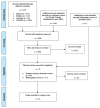The state of wellbeing education across North American medical schools: a scoping review
- PMID: 39310320
- PMCID: PMC11415736
- DOI: 10.36834/cmej.76095
The state of wellbeing education across North American medical schools: a scoping review
Abstract
Background/objective: Medical students experience increased rates of burnout and mental illness compared to the general population. Yet, it is unclear to what extent North American medical schools have adopted formal wellbeing curricula. We sought to establish prevailing themes of existing wellbeing educational interventions to identify opportunities for further curricular development.
Methods: We conducted a scoping review of the literature to identify wellbeing education programs implemented for undergraduate medical students across North America. We searched four comprehensive databases and grey literature and only included published original research. Two independent researchers screened all papers, with a third resolving disagreements. Two researchers conducted the data extraction using a continuously refined template, with a third researcher resolving any discrepancies.
Results: We identified 3996 articles in the initial search of which 30 met inclusion criteria and were included for further analysis. The most common types of interventions were mindfulness and meditation practices. 27 studies found that their wellbeing sessions contributed to positive wellbeing outcomes of learners.
Conclusions: Our review identified that there are few wellbeing curricular initiatives that have been evaluated and published in the literature. Additionally, the methodology and rigour of wellbeing curriculum evaluation to date leaves significant room for improvement. The existing literature does suggest that the adoption of a wellbeing curriculum has the potential to improve outcomes for medical students. These findings can be used to assist the development of a validated wellbeing curricular framework for wellbeing initiatives. However, while such a curriculum may represent an effective tool in enhancing medical trainee wellbeing, it cannot effect change in isolation; lasting and meaningful change will require concurrent shifts within the broader systemic framework and cultural fabric of the medical education system.
Contexte/objectif: Les étudiants en médecine connaissent des taux plus élevés d'épuisement professionnel et de maladie mentale que la population générale. Pourtant, on ne sait pas exactement dans quelle mesure les facultés de médecine nord-américaines ont adopté un curriculum formel sur le bien-être. Nous avons cherché à établir les thèmes dominants des interventions éducatives existantes en matière de bien-être afin d'identifier les possibilités de développement curriculaire.
Méthodes: Nous avons procédé à un examen approfondi de la littérature à la recherche de programmes de formation en matière de bien-être mis en œuvre pour les étudiants en médecine de niveau prédoctoral en Amérique du Nord. Nous avons interrogé quatre bases de données exhaustives et la littérature grise et n'avons retenu que les recherches originales publiées. Deux chercheurs indépendants ont examiné tous les articles, un troisième étant chargé de résoudre les éventuels désaccords. Deux chercheurs ont procédé à l'extraction des données en suivant un modèle prédéterminé qui a été affiné de façon itérative, un troisième chercheur étant chargé de résoudre les éventuelles divergences.
Résultats: Nous avons identifié 3996 articles lors de la recherche initiale, dont 30 répondaient aux critères d'inclusion et ont été retenus pour une analyse plus approfondie. Les types d'interventions les plus courants étaient les pratiques de pleine conscience et de méditation. Au total, 27 études ont montré que leurs sessions de bien-être contribuaient à des résultats positifs quant au bien-être des apprenants.
Conclusions: Notre revue de la littérature actuelle a révélé que peu d'initiatives curriculaires en matière de bien-être ont été évaluées et publiées dans la littérature. En outre, la méthodologie et la rigueur de l'évaluation des curriculum sur le bien-être à ce jour laissent une grande place à l'amélioration. La littérature existante suggère que l'adoption d'un curriculum sur le bien-être peut améliorer les résultats des étudiants en médecine. Ces résultats peuvent être utilisés pour aider au développement d'un cadre validé de curriculum sur le bien-être pour les initiatives dans ce domaine.
© 2024 Raiter, Yau, Sharma, Lewis, Do; licensee Synergies Partners.
Conflict of interest statement
All authors state that there are no conflicts of interest.
Figures
Similar articles
-
Beyond the black stump: rapid reviews of health research issues affecting regional, rural and remote Australia.Med J Aust. 2020 Dec;213 Suppl 11:S3-S32.e1. doi: 10.5694/mja2.50881. Med J Aust. 2020. PMID: 33314144
-
Recovery schools for improving behavioral and academic outcomes among students in recovery from substance use disorders: a systematic review.Campbell Syst Rev. 2018 Oct 4;14(1):1-86. doi: 10.4073/csr.2018.9. eCollection 2018. Campbell Syst Rev. 2018. PMID: 37131375 Free PMC article.
-
Post-Carnegie II curricular reform: a north American survey of emerging trends & challenges.BMC Med Educ. 2019 Jul 12;19(1):260. doi: 10.1186/s12909-019-1680-1. BMC Med Educ. 2019. PMID: 31299948 Free PMC article. Review.
-
Training medical students to manage difficult circumstances- a curriculum for resilience and resourcefulness?BMC Med Educ. 2019 Jul 25;19(1):280. doi: 10.1186/s12909-019-1712-x. BMC Med Educ. 2019. PMID: 31345199 Free PMC article.
-
To the Point: a prescription for well-being in medical education.Am J Obstet Gynecol. 2019 Dec;221(6):542-548. doi: 10.1016/j.ajog.2019.05.012. Epub 2019 Jun 7. Am J Obstet Gynecol. 2019. PMID: 31181180 Review.
References
-
- Canadian Federation of Medical Students . CFMS-FMEQ national health and wellbeing survey-student research position. International Conference on Physician Health. Boston; 2016. Available from: https://www.cfms.org/uploads/news-documents/Wellness_Survey_Research_Pos.... [Accessed on Aug 25, 2022].
Publication types
MeSH terms
LinkOut - more resources
Full Text Sources
Miscellaneous

